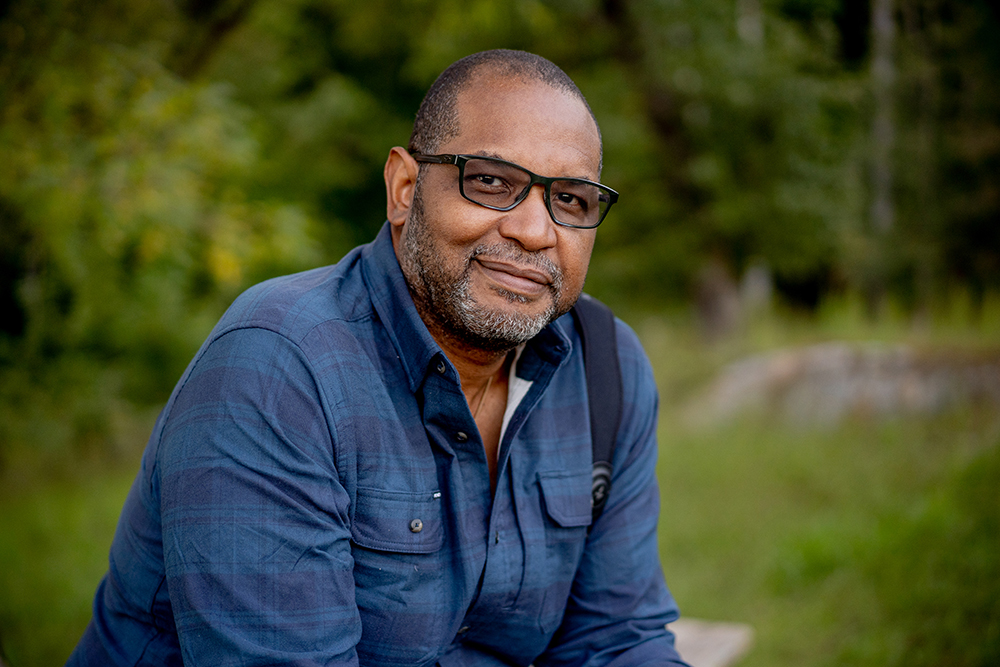The College of Arts & Letters is pleased to host MacArthur Fellow and acclaimed scholar, author, poet, and wildlife biologist Dr. J. Drew Lanham as part of the Signature Lecture Series. Lanham will speak about his experiences across the arts and sciences and explore racial and social themes connected with access to natural spaces in a lecture titled “Birding While Black” on Tuesday, March 12, at 7 p.m. in the Kellogg Center Auditorium. Beginning at 6:30 p.m., refreshments will be served.
A conservation and cultural ornithologist, Lanham is an Alumni Distinguished Professor and Master Teacher of Wildlife Ecology at Clemson University where his most recent scholarly efforts address the confluences of race, place, and nature.

“I think about the lay of the land,” Lanham said at a recent event. “I think about how land came to be, what natural forces have changed the land, what human forces have mangled the land. I think about how concrete and asphalt often doom the land. I think about how land rises and runs, lifts, and falls.”
Lanham has published extensively in scientific literature and has taught courses in conservation biology, forest ecology, wildlife policy, ornithology, and environmental literature/nature writing. He has a Ph.D. in Forest Resources and an M.S. and B.A. both in Zoology, and all from Clemson University.
“We are thrilled to welcome Dr. Lanham to campus on March 12,” said Garth Sabo, Assistant Professor in MSU’s Center for Integrative Studies in the Arts and Humanities (CISAH). “We started dreaming about the possibility of this lecture over a year ago and are grateful to the College of Arts & Letters and our other partners across campus for their support.
“Dr. Lanham is everything the Signature Lecture ought to be. He is at the absolute top of his field, and his work has won accolades for exploring the ways that the arts and sciences rely upon each other. “
Garth Sabo, Assistant Professor in the Center for Integrative Studies in the Arts and Humanities
“Dr. Lanham is everything the Signature Lecture ought to be. He is at the absolute top of his field, and his work has won accolades for exploring the ways that the arts and sciences rely upon each other. He talks about finding a sense of self in nature, approaching the world with wonder, and navigating forms of belonging, especially in the face of structures that are designed to exclude. These are insights we sorely need right now, and the time has never been better to use birds as our guide for thinking about structures of power.”
Creatively, Lanham is the Poet Laureate of Edgefield County, South Carolina, and the author of three books: Sparrow Envy: Poems, Sparrow Envy: A Field Guide to Birds and Lesser Beasts, and The Home Place: Memoirs of a Colored Man’s Love Affair with Nature. His memoir, The Home Place, is a winner of the Reed Environmental Writing Award, the Southern Book Prize, and a 2017 finalist for the Burroughs Medal. It was named a memoir and scholarly book of the decade by Lithub and the Chronicle of Higher Education.
His upcoming book, Joy Is the Justice We Give Ourselves, which is set to be released in April 2024, is a collection of prose and poetry where he mines the deep connection to ancestors through the living world and tunes his unique voice toward embracing the radical act of joy.



“When we first started talking about this lecture, Dr. Lanham’s name was the first to come to my mind. His poetry and essays have the remarkable ability to draw connections between ideas that seem disconnected by zooming in on the small details, the creatures and moments one might otherwise forget. In these, he illuminates threads connecting to history, place, and biology that could easily be missed,” said Matthew Rossi, Assistant Professor in the Department of Writing, Rhetoric, and American Cultures. “His work represents for me the essential mission of the College of Arts & Letters, to bring meaning to our work through reflection and observation.”
As a birder, naturalist, and hunter-conservationist, Lanham has published several essays and poems in many different publications including Orion, Audubon, Vanity Fair, NPR, Sierra Magazine, The New York Times, Patagonia, and Wilderness, and in several anthologies, including The Colors of Nature, State of the Heart, Bartram’s Living Legacy, and Carolina Writers at Home.
“[Dr. Lanham’s] poetry and essays have the remarkable ability to draw connections between ideas that seem disconnected by zooming in on the small details, the creatures and moments one might otherwise forget. In these, he illuminates threads connecting to history, place, and biology that could easily be missed.”
Matthew Rossi, Assistant Professor in the Department of Writing, Rhetoric, and American Cultures
Lanham also is a playwright and visual artist as well as an evolving librettist with a poem about whimbrels in the process of becoming an operetta. He has been a guest curator at several museums and is sought for his ekphrastic expressions interpreting visual works of art in poetry. He has been featured by several museums, including the Smithsonian Museum and Carnegie Museum in 2023-2024.
A 2022 MacArthur Fellow, Lanham also was named one of the 100 most influential Black Americans by The Root in 2022. As a native of Edgefield and Aiken, South Carolina, he is intensely southern and rural, despising the regressive politics of the entrenched and racist “old South,” but deeply loves the region’s ecology and is hopeful that a better South will equate to a better world.
“I’ve been all over this world, but my wanderlust seems to always find its way home to Piedmont clay, to loblolly pine, to prairie warblers and bob white quail,” Lanham said. “My obsession is born of that land in Edgefield, South Carolina, that nurtured me — land in the middle of nowhere. It is born of growing up on garden-raised vegetables, on our own pasture-fed beef and the sweet fruits of our own orchards. It is born of some of the best years of my life.
Signature Lecture Series
The March 12 Signature Lecture is free and open to the public, but tickets are required. To reserve your seat, visit the MSU Signature Lecture Series: Birding While Black event page.
This event is sponsored by the College of Arts & Letters in partnership with the College of Agriculture and Natural Resources; Lyman Briggs College; Department of African American and African Studies; Department of Writing, Rhetoric, and Cultures; Center for Integrative Studies in the Arts and Humanities; Beal Botanical Garden; Michigan Audubon Society; and the Capital Area Audubon Society.

Originally founded as the Celebrity Lecture Series in 1998 by the College of Arts & Letters and the Dean’s Community Council, the series was later renamed the Signature Lecture Series in 2007.
The Signature Lecture Series enables opportunities for notable public figures to interact and engage with MSU faculty, students, staff, alumni, and greater community through conversations and wide-ranging discussions of contemporary ideas, social issues, and creative achievements in the arts and humanities.
Support for this series has come from sponsors within Michigan State University, the MSU alumni community, and local and state communities. This generosity has helped us bring to campus some of the most illustrious scholars, critics, novelists, poets, film producers, and creative artists of our time. Some of the past speakers include Maya Angelou, Ken Burns, Richard Ford, Ann Hamilton, Trevor Noah, Soledad O’Brien, Claudia Rankine, and Oliver Stone.


